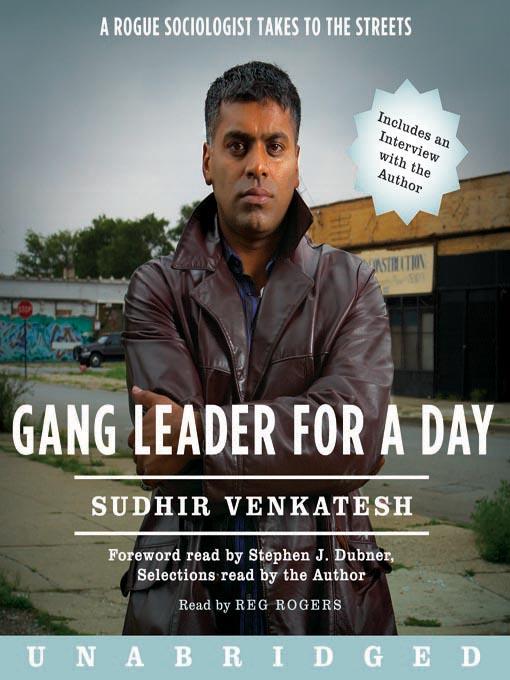
Gang Leader for a Day
کتاب های مرتبط
- اطلاعات
- نقد و بررسی
- دیدگاه کاربران
نقد و بررسی

Reg Rogers's mix of distance and emotion is a perfect vehicle for the author's story of his experiences as a young Chicago sociologist who hangs with the Black Kings gang to understand the role of poverty in their lives. Sudir rides the waves of day-to-day events. One day he's impressed by the sense of community among the gang members; the next he's horrified by the beating of an elderly man. Before long he's wondering how to carry out his research without becoming involved. Rogers's voice particularly animates people of authority. Ms. Bailey, an elderly woman who has controlled neighborhood situations for three decades, sounds ready to take action. Gang leader J.T. comes across as brusque, clipped, and menacing. S.W. (c) AudioFile 2008, Portland, Maine

November 5, 2007
Honest and entertaining, Columbia University professor Venkatesh vividly recounts his seven years following and befriending a Chicago crack-dealing gang in a fascinating look into the complex world of the Windy City's urban poor. As introduced in Steven D. Levitt and Stephen J. Dubner's bestseller, Freakonomics
, Venkatesh became involved with the Black Kings—and their charismatic leader J.T.—as a first-year doctoral student at the University of Chicago. Sent to the projects with a multiple-choice test on poverty as his calling card, Venkatesh was, to his surprise, invited in to see how the drug dealers functioned in real life, from their corporate structure to the corporal punishment meted out to traitors and snitches. Venkatesh's narrative breaks down common misperceptions (such as all gang members are uneducated and cash rich, when the opposite is often true), the native of India also addresses his shame and subsequent emotional conflicts over collecting research on illegal activities and serving as the Black Kings' primary decision-maker for a day—hardly the actions of a detached sociological observer. But overinvolved or not, this graduate student turned gang-running rogue sociologist has an intimate and compelling tale to tell.

March 31, 2008
In the late 1980s and 1990s, “rogue sociologist” Venkatesh infiltrated the world of tenant and gang life in Chicago's Robert Taylor Home projects. He found a complex system of compromises and subsistence that makes life (barely) manageable. Venkatesh excellently illustrates the resourcefulness of impoverished communities in contrast to a society that has virtually abandoned them. He also reveals the symbiotic relationship between the community and the gangs that helps sustain each. Reg Rogers reads with great emphasis and rhythm. His lilting, cadence and vocal characterization of tenants is enjoyable. Rogers's first-person narrative establishes a deep intimacy with the reader. Venkatesh reads the final chapter, but he lacks the subtly and nuance that Rogers projects throughout his reading. The insubstantial author interview on the last disc mostly covers material already discussed in the book. Simultaneous release with the Penguin Press hardcover (Reviews, Nov. 5, 2007).

























دیدگاه کاربران